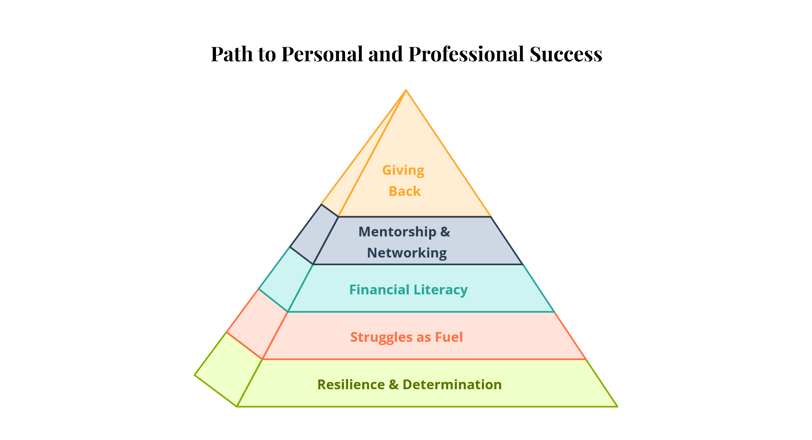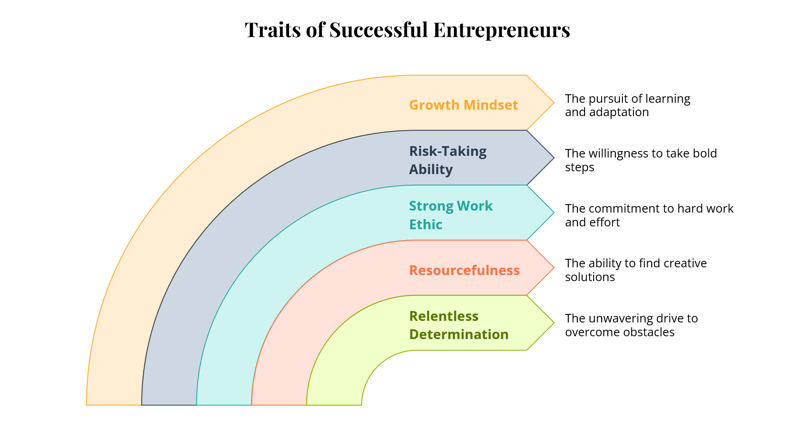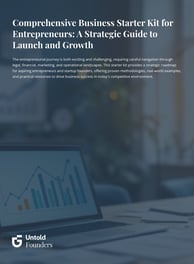From Poverty to Prosperity: Inspiring Stories of Entrepreneurs Who Overcame Adversity
Discover inspiring rags-to-riches stories of entrepreneurs who rose from poverty to success. Learn key lessons to start your own journey to financial freedom!


From Poverty to Prosperity: Inspiring Stories of Entrepreneurs Who Overcame Adversity
Success stories often shine the brightest when they come from the darkest of beginnings. Some of the world’s most influential entrepreneurs didn’t start with wealth, connections, or an Ivy League education. Instead, they began their journeys in poverty, facing struggles that could have easily held them back. Yet, through grit, determination, and sheer resilience, they transformed their lives and built empires.
For aspiring entrepreneurs and side hustlers, these stories serve as a beacon of hope. They prove that no matter where you come from, with the right mindset and strategies, success is possible. In this article, we’ll dive into how adversity shapes great entrepreneurs, explore the key challenges they overcame, and uncover the common traits that helped them rise above their circumstances.
The Power of Resilience: How Adversity Shapes Great Entrepreneurs
Resilience is the secret weapon of every successful entrepreneur. When you grow up facing financial struggles, limited opportunities, and countless obstacles, you either crumble under the pressure or develop an unshakable drive to succeed. Entrepreneurs who come from poor backgrounds often develop a deep hunger for success because they know what it’s like to have nothing.
Adversity teaches problem-solving skills that no business school can. When resources are scarce, creativity becomes a survival tool. When opportunities are few, persistence becomes a necessity. The ability to adapt, innovate, and push forward despite challenges is what separates ordinary individuals from extraordinary entrepreneurs.
Many of the greatest business minds of our time—people like Jan Koum (WhatsApp), Oprah Winfrey (OWN Network), and Howard Schultz (Starbucks)—started their journeys in hardship. They didn’t just survive; they used their struggles as fuel to build something incredible. Their stories remind us that resilience isn’t just about bouncing back—it’s about rising higher than before.
Why Stories of Rags-to-Riches Entrepreneurs Inspire Millions
Stories of entrepreneurs who rise from poverty resonate deeply with people because they prove that success isn’t reserved for the privileged. They show that anyone—regardless of their background—can carve out a different future through hard work, smart decisions, and perseverance.
These stories inspire millions because they challenge the belief that success is only for those with the right connections or financial safety nets. They give hope to the underdog, proving that with the right mindset and relentless effort, anything is possible.
For aspiring entrepreneurs, these success stories serve as a roadmap. They highlight the importance of resilience, strategic thinking, and seizing opportunities, no matter how small. More importantly, they remind us that failure isn’t the end—it’s just a stepping stone to success.
The Common Traits of Successful Entrepreneurs from Poor Backgrounds
What do all these self-made entrepreneurs have in common? While their industries and stories may differ, they share key traits that helped them break free from poverty and build thriving businesses:
Relentless Determination: They refuse to give up, no matter how many obstacles stand in their way.
Resourcefulness: They find creative solutions even when they lack financial or material support.
Strong Work Ethic: They’re willing to put in the hard work, often outworking their competition.
Risk-Taking Ability: They’re not afraid to take bold steps, even when the odds are against them.
Growth Mindset: They constantly seek to learn, improve, and adapt to changing circumstances.
















These traits aren’t reserved for a select few—they can be cultivated by anyone willing to commit to their goals.
The Journey from Poverty to Success: Key Challenges and Turning Points
Success doesn’t happen overnight, and for those starting with nothing, the journey is even more challenging. Here are some of the biggest hurdles entrepreneurs from poor backgrounds have had to overcome—and how they did it.
Economic Hardships: Growing Up with Financial Struggles
Poverty isn’t just about having less money—it’s about having fewer opportunities. Many successful entrepreneurs grew up in households where every dollar mattered, where they had to work multiple jobs just to make ends meet, or where financial insecurity was a daily reality.
Yet, financial struggles often ignite a fire within. The desperation to escape poverty pushes individuals to work harder, think smarter, and take calculated risks. Entrepreneurs like Daymond John (FUBU) started by selling products door-to-door, while Howard Schultz (Starbucks) was the first in his family to go to college, determined to create a better future.
Rather than letting financial hardship hold them back, they used it as motivation to build businesses that could change their lives.
Limited Access to Education: How Entrepreneurs Overcame Learning Barriers
For many aspiring entrepreneurs, formal education is either inaccessible or cut short due to financial constraints. However, those who succeed understand that learning isn’t confined to a classroom. They educate themselves through books, mentors, online courses, and real-world experience.
Self-made billionaire Dhirubhai Ambani, founder of Reliance Industries, never attended college. Instead, he learned business by working in trading markets and observing industry trends. Similarly, Elon Musk devoured books and taught himself programming long before starting his companies.
The key takeaway? Education is important, but formal schooling isn’t the only path to knowledge. Successful entrepreneurs cultivate a mindset of lifelong learning, seeking wisdom wherever they can find it.
Lack of Resources: Starting a Business with Little to No Capital
One of the biggest myths about entrepreneurship is that you need a lot of money to start. The truth? Many of the world’s biggest brands began with almost nothing.
Jan Koum (WhatsApp) couldn’t afford a phone growing up, yet he built one of the most popular messaging apps in history. Colonel Sanders (KFC) started selling his fried chicken recipe at age 65, living out of his car while pitching his business to restaurants.
Entrepreneurs with little capital learn to leverage what they do have—whether it’s skills, connections, or sheer determination. They bootstrap, reinvest profits, and use smart strategies to scale their businesses over time.
Social and Cultural Barriers: Fighting Against Stereotypes and Biases
For many entrepreneurs, financial struggles are only part of the challenge. Many face discrimination due to their background, ethnicity, or social status. Society often underestimates those who come from disadvantaged communities, making it even harder for them to gain credibility and opportunities.
Oprah Winfrey battled racial and gender discrimination before becoming a media mogul. Strive Masiyiwa (Econet Wireless) faced government resistance in Zimbabwe before building Africa’s leading telecom company.
These entrepreneurs broke barriers by proving their worth through action. They let their results speak louder than societal biases, paving the way for others to follow.
The Role of Mentors and Support Systems: How Guidance Changed Their Paths
Even the most determined entrepreneurs benefit from mentorship and support. Having a mentor can provide valuable insights, open doors to opportunities, and offer encouragement during tough times.
Many self-made entrepreneurs credit mentors for helping them navigate business challenges. For example, Mark Zuckerberg had Steve Jobs as an early mentor, while Warren Buffett was guided by Benjamin Graham. Mentorship doesn’t always come from famous figures—it can be a teacher, a boss, or even a book that changes your perspective.
Surrounding yourself with the right people—whether it’s a mentor, a supportive community, or like-minded hustlers—can make all the difference in achieving success.
This is just the beginning of the journey. As we dive deeper into the incredible success stories of entrepreneurs who started with nothing, you’ll see how these challenges weren’t roadblocks—they were stepping stones to greatness.
Stay inspired, keep hustling, and remember: No matter where you start, your future is in your hands. 🚀
Real-Life Success Stories: Entrepreneurs Who Started with Nothing
Success often emerges from struggle, and the following entrepreneurs are proof that your starting point does not dictate your future. They faced immense hardships—poverty, lack of education, and social biases—yet turned their lives around through relentless determination. Let’s explore their journeys.
Tech Industry Trailblazers
Jan Koum (WhatsApp) – From Food Stamps to a Billion-Dollar Tech Empire
Jan Koum’s story is a true rags-to-riches tale. Born in Ukraine, he moved to the U.S. with his mother as a teenager, escaping hardship but landing in poverty. They relied on food stamps to survive, and Koum took cleaning jobs to help his family. Despite financial struggles, he taught himself coding, eventually landing a job at Yahoo. Years later, he co-founded WhatsApp, a simple messaging app that grew into a global phenomenon. In 2014, Facebook acquired WhatsApp for $19 billion, turning Koum into one of the most successful self-made tech entrepreneurs in history.
Do Won Chang (Forever 21) – A Struggling Immigrant Who Built a Global Fashion Brand
Arriving in America from South Korea with barely any money, Do Won Chang worked multiple jobs—including janitorial work and pumping gas—to support himself. He noticed that wealthy people in the U.S. were often in the retail business, sparking his ambition to enter the fashion industry. In 1984, he and his wife opened a small clothing store in Los Angeles, later rebranded as Forever 21. Through hard work and smart business strategies, they transformed it into a billion-dollar fast-fashion empire.
Elon Musk (Tesla, SpaceX) – Overcoming Childhood Hardships to Revolutionize Industries
Elon Musk’s journey to becoming one of the world’s most influential entrepreneurs was far from easy. Growing up in South Africa, he faced bullying, an unstable family life, and financial struggles. At 17, he moved to North America with little money and worked odd jobs while pursuing his studies. Despite setbacks, he co-founded Zip2, then PayPal, which eBay acquired for $1.5 billion. He reinvested his earnings into Tesla, SpaceX, and other ventures that have since transformed space travel, energy, and transportation.
Retail and Consumer Goods Giants
Howard Schultz (Starbucks) – From a Poor Neighborhood to a Coffee Empire
Raised in a low-income housing complex in Brooklyn, Howard Schultz saw firsthand what financial struggle looked like. His father worked low-wage jobs with no health benefits, which fueled Schultz’s drive to create a business that valued its employees. After college, he discovered Starbucks, then a small coffee shop. Inspired by Italian coffee culture, he turned Starbucks into a global brand. Today, it’s a multi-billion-dollar company with thousands of stores worldwide.
Sam Walton (Walmart) – Building the World’s Largest Retail Chain from Scratch
Sam Walton grew up during the Great Depression, learning the value of hard work early. His first business venture was a small retail store, where he applied innovative discount strategies. Walton’s relentless focus on customer affordability led to the creation of Walmart, now the world’s largest retailer. His ability to scale operations while maintaining low prices revolutionized the shopping industry.
Daymond John (FUBU) – A Broke Kid Who Turned His Fashion Vision into Millions
Growing up in Queens, New York, Daymond John saw entrepreneurship as his only way out of poverty. He started FUBU (For Us, By Us), a streetwear brand, by sewing and selling hats from his mother’s house. With persistence and grassroots marketing—having rappers wear his designs—FUBU exploded in popularity. Today, John is a millionaire entrepreneur and investor on Shark Tank, mentoring new business owners.
Inspirational Entrepreneurs from Developing Countries
Dhirubhai Ambani (Reliance Industries) – A Gas Station Attendant Who Became a Billionaire
Born into a modest Indian family, Dhirubhai Ambani started his career as a gas station attendant in Yemen. With a sharp business mind, he returned to India and launched Reliance Industries, first dealing in textiles and later expanding into telecommunications, petrochemicals, and retail. His vision transformed Reliance into one of India’s biggest conglomerates.
Strive Masiyiwa (Econet Wireless) – Fighting Adversity to Build Africa’s Telecom Giant
Strive Masiyiwa grew up in Zimbabwe, where he faced not only financial struggles but also political obstacles. Determined to provide better telecommunications for Africa, he battled government resistance for nearly five years before finally launching Econet Wireless. Today, his company serves millions across the continent, proving that persistence can break even the toughest barriers.
Mo Ibrahim (Celtel) – How a Refugee Built a Revolutionary Mobile Network
Mo Ibrahim, originally from Sudan, fled war and political instability, later earning a PhD in telecommunications. Seeing Africa’s need for mobile networks, he founded Celtel, providing millions with access to communication. He later sold the company for billions and focused on philanthropy, supporting good governance in Africa.
Female Entrepreneurs Who Defied the Odds
Oprah Winfrey (OWN Network) – From Poverty and Abuse to Media Mogul
Oprah Winfrey’s journey is nothing short of remarkable. Born into poverty in Mississippi, she faced abuse and hardship from a young age. Despite this, she excelled in school and broke into broadcasting. Through perseverance, she became a media icon, launching The Oprah Winfrey Show and later her own television network.
Madam C.J. Walker – The First Female Self-Made Millionaire in America
Born in the 1800s to formerly enslaved parents, Madam C.J. Walker worked as a washerwoman before developing a groundbreaking hair care product for Black women. Through savvy marketing and entrepreneurship, she built an empire and became America’s first self-made female millionaire.
Sara Blakely (Spanx) – From Door-to-Door Sales to a Billion-Dollar Empire
With just $5,000 in savings, Sara Blakely created Spanx, a shapewear company that revolutionized the fashion industry. She faced rejection from manufacturers but persisted, ultimately growing Spanx into a billion-dollar brand.
Entrepreneurs Who Made It Big in Food & Hospitality
Jay-Z (Roc Nation) – From the Streets to a Billion-Dollar Empire
Growing up in Brooklyn’s Marcy Projects, Jay-Z turned his rap career into a business empire spanning music, fashion, and sports management.
LeBron James (SpringHill Company) – From a Tough Childhood to Sports and Media Dominance
Raised by a single mother in poverty, LeBron James became an NBA legend and a successful entrepreneur with business ventures in media and entertainment.
Rihanna (Fenty Beauty) – Turning Music Fame into a Fashion Empire
Rihanna leveraged her music career to build Fenty Beauty, a brand celebrated for inclusivity, making her a billionaire entrepreneur.
Lessons from Their Journeys: What We Can Learn
Resilience and determination are essential.
Struggles can be fuel for success.
Financial literacy is crucial.
Mentorship and networking accelerate growth.
Giving back creates lasting impact.
Colonel Sanders (KFC) – A Man Who Found Success After 65
Colonel Harland Sanders faced multiple career failures before perfecting his fried chicken recipe. At 65, he franchised KFC, turning it into a global fast-food empire.
Narayan Murthy (Infosys) – From Middle-Class Struggles to Global Tech Leadership
Narayan Murthy co-founded Infosys in India with minimal capital but strong determination, transforming it into a global IT powerhouse.
J.K. Rowling (Harry Potter) – A Single Mother Who Built a Publishing Empire
Once struggling to afford meals, J.K. Rowling wrote Harry Potter while living on welfare. Her books became a worldwide phenomenon, making her one of the richest authors ever.
Athletes & Entertainers Who Became Business Moguls
Conclusion: The Road to Success is Possible for Anyone
Your background doesn’t define your future. If these entrepreneurs overcame extreme hardships, so can you. Stay focused, keep learning, and take action—your success story is waiting to be written.
🚀 Your journey starts now.
Explore more
The Best Entrepreneur Books
to Inspire and Build Your Business
The right books can equip you with the mindset, knowledge, and practical steps needed to turn your ideas into a thriving business
The Ultimate Business Starter Kit
Your Roadmap to Launching a Profitable Business
Get instant access to our FREE strategic guide that simplifies business launch complexities.




